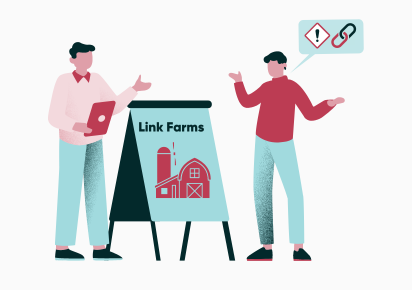Our Links Are Trusted By 2,500+ SEO Agencies
Our Links Are Trusted By 2,500+ SEO Agencies
By the Rhino Rank team
11th Dec 2023

Unraveling the mystery of link farming can seem like a challenging task. But it’s vital to understand these deceptive back hat link building practices and why you should opt for ethical search engine optimization (SEO) link building instead.
In this blog post, we’ll demystify link farms and discuss their origins, characteristics, and consequences. We’ll also explore Google’s stance on link farming, ethical alternatives, and how to protect your website from link farms.
So, are you ready to uncover the secrets of link farming? Let’s get started.
Search engine algorithms have evolved significantly since the emergence of link farms and Private Blog Networks (PBNs), both of which aim to manipulate search rankings by inflating a website’s inbound links.
In the early days, search engines relied heavily on reciprocal linking and backlink numbers to determine a website’s PageRank, meaning link farm backlinks were extremely effective. However, now webmasters need to focus on ethical techniques, such as building curated inbound links, rather than resorting to forming “link farm” sites with automated programs or expired domains.
This is because Google, along with other major search engines, penalizes websites using these black hat SEO techniques, causing their listings in searches to drop or be de-indexed and removed from the search results altogether. Therefore, it has become widely accepted that focusing on quality over quantity when building external links is an essential part of SEO.
So, if website owners want to achieve high keyword placements and generate consistent website visits and conversions, then ethical link building is essential.
Link farms were first developed in 1999 to take advantage of the Inktomi search engine’s dependence on “link popularity” and help boost a website’s online visibility. At the time, Inktomi was used by several popular search engines; and even Yahoo!, the most popular search service at the time, used it to boost its directory listings.
However, when Google increased in popularity, SEO experts identified that Google’s ranking algorithm utilized a “link-weighting scheme” called PageRank. This meant that rather than counting the number of inbound links equally, the PageRank algorithm identified that some links were more valuable, and these links were assigned more “weight” and had a bigger impact. As a result, link farming became a way for website owners to quickly manipulate their site’s inbound links and artificially boost its PageRank.
Google’s sophisticated algorithm is now able to identify sites that are manipulating search engine rankings and detect unnatural link patterns. Once detected, these websites can face harsh penalties, such as degraded search engine rankings or even being completely taken out of search results, meaning their visibility is reduced dramatically.
So, to safeguard against potential issues arising from unethical link building, it’s important to focus on ethical techniques when building links, as this will help maintain and improve your website’s presence with online searches. Monitoring your website’s backlink profile is essential now more than ever before.
To combat the growing number of link farms and other black hat SEO tactics, Google has rolled out multiple algorithm updates. In particular, the Panda update was introduced to promote websites with high quality content, whilst those with spammy, irrelevant and duplicated content were filtered out of the search results. In addition, the Penguin update aimed to optimize the search results for users, meaning sites that utilized deceptive link building techniques, such as keyword stuffing, received penalties that adversely affected the SERP ranking positions of offending websites.
In 2022, Google also released its link spam update, which stated:
“Any links that are intended to manipulate rankings in Google Search results may be considered link spam. This includes any behavior that manipulates links to your site or outgoing links from your site.”
It is clear link farms are included in this statement, and therefore utilizing them to build your backlink profile directly violates Google’s guidelines.
So, if you want to maintain your website’s visibility in search engine results pages and avoid Google penalties, it is important to avoid unethical link building at all costs.
It is crucial to be able to detect link farms to safeguard your website’s reputation and online presence.
By analyzing your website’s inbound links, using tools like Ahrefs and Semrush, it is possible to detect link farm activity. Common indicators that identify link farms include:
With this knowledge, it becomes much simpler for you to detect link farm activity. Appropriate measures can then be taken to ensure that any penalties associated with using link farms are avoided.
Link farms are notorious for their use of off-topic and spammy domain names and low quality content, both of which aim to manipulate search engine rankings.
Associating your website with such sites can negatively impact your SEO metrics and put your site’s credibility at risk. For instance, the technology sector is particularly susceptible, as a lot of these link farms want to capitalize on the popularity of this industry and boost their website traffic by promoting tech-related content, but this content is often subpar or completely inaccurate. As a result, this can decrease user trustworthiness towards genuine websites, especially if they appear to be closely connected to the link farm network.
To combat this, you should avoid connecting yourself to any domains that may be deemed shady or post questionable content. Doing so will ensure you set yourself up as an industry leader, help improve your online authority and credibility, and show search engines like Google that you are complying with their guidelines.
Search engines often assess a website’s credibility based on the relevance and quality of their outbound links. Having too many outbound links, and no inbound links, is often viewed as spam by search engine ranking algorithms, which can cause your site to be penalized and your rankings to drop.
As mentioned above, the risks associated with a link farm also include decreased trust and user confusion. This is because links to irrelevant sites disrupt and damage the user’s journey.
To maintain a positive SEO score, it is important to prioritize creating high quality, relevant links. Avoiding attempts to manipulate inbound links or sell connections is also crucial, as this will help preserve your reputation and enhance link popularity among other websites within its network.
Monitoring your backlink profile using Linkody, Sitechecker, Ahrefs, Moz, SEMRush, Majestic or Ranktracker is essential to protect against link farming. If you detect such links on your site’s pages, it’s important to promptly initiate the disavowing process so that its search engine rankings and reputation remain intact. Being attentive while following ethical SEO techniques will prevent any harm from being caused by link farms to your website in the long run.
Avoiding link farming is essential for your website’s success. Engaging in these unethical practices can severely damage its reputation and hinder search engine rankings. If a site is seen to be using black hat link building tactics to manipulate its rankings, it could receive a harsh penalty, such as decreased ranking or complete removal from indexes.
To maintain credibility and enhance site visibility, it’s important to concentrate on legitimate SEO techniques that involve creating high-quality links, rather than relying on spam links generated by link farms.
Instead of using the outdated and risky practice of link farming, there are ethical ways to increase your website’s keyword rankings and build an organic backlink profile. Utilizing techniques such as building Curated Links, drafting and publishing high-quality content in the form of guest blogs, and engaging in honest linking opportunities with established websites is a great place to start. If you want to achieve long term rankings results, then avoiding black hat SEO tactics, like link farms and Private Blog Networks (PBNs) is essential.
Developing quality content not only ensures you deliver beneficial information to readers but also establishes your website as an authoritative source of correct information. This will not only increase brand recognition, but it will also help you attract organic links from legitimate sites; rather than relying on unethical methods to artificially boost rankings and deceive users.
In this blog post, we’ve explored link farms and the impact they have on a website’s search engine results and online reputation. We’ve also explored Google’s view on black hat backlink building and identified ethical alternatives to generate links that will positively affect the keyword rankings for your website. By understanding how to avoid link farming, you can protect the credibility and success of your site in a continuously evolving SEO landscape.
It is essential to stay informed about industry trends and Google algorithm updates so that your website has the best chances of online success. Avoiding the risks associated with unethical link building ensures that your online presence continues to grow sustainably, giving you long-term ranking results.
Link farming is a black hat SEO tactic and is where a group of websites all link to each other to artificially increase their search engine rankings. This practice is not supported by search engines like Google and can result in severe penalties, including lower rankings or removal from search results.
Link farm backlinks are links that are built using a network of websites. Typically, these websites will all link to each other to boost their authority, at which point they will then sell their links to other sites, so they can also boost their online rankings.
Link farming is not illegal, however, it is frowned upon as engaging in link farming violates the guidelines of major search engines, including Google. So, to avoid being penalized, website owners need to avoid link farming and focus on building ethical, high quality links instead.
Link farming is often used as part of a manipulative SEO strategy. While there may be some short-term benefits that come with using link farms, for long-term ranking results and improved SEO results it’s best to focus on building white hat links that will deliver consistent performance benefits.
Link farms can be easily spotted thanks to their low Google PageRank, continuous link to unrelated sites, use of poor quality content, use of black hat link building techniques (like keyword stuffing), and their web pages will cover seemingly random topics.
Link farms are a series of websites that all link to each other to improve their search rankings. Link farms are very similar to Private Blog Networks (PBNs), but the difference is that PBNs are built with the sole intention of linking to external websites, to boost their “link juice” and keyword placements.
To safeguard your website from link farms, it is important to regularly monitor your site’s inbound links, disavow any harmful connections, and adhere to ethical SEO practices. Regularly analyzing your backlink profile is crucial for maintaining your site’s integrity and credibility.

Join 2,500+ SEO's Who Use Our Link Building Service
Create a free account